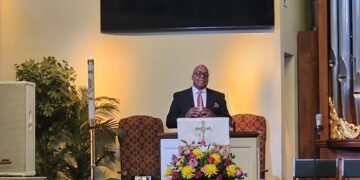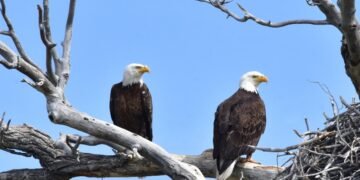Courtesy of Kentucky Lantern
March 15, 2024
FRANKFORT — The GOP-dominated Senate narrowly advanced a controversial change for Kentucky’s wildlife management agency Friday while also voting to administratively attach the racing commission to the state agriculture department as well.
Sportsmen’s and wildlife conservation groups have strongly opposed the proposal, and lawmakers echoed their concerns during Friday’s debate.
Senate Bill 3, primarily sponsored by Sen. Jason Howell, R-Murray, was approved 20-16, with nine Republicans joining the minority of Democrats in opposition. The bill is now under the Kentucky House of Representatives’ consideration.
SB 3 would move the Kentucky Department of Fish and Wildlife Resources (KDFWR) from the tourism cabinet, a part of Democratic Gov. Andy Beshear’s administration, and attach it to the Kentucky Department of Agriculture overseen by Republican Agriculture Commissioner Jonathan Shell, a former House leader elected to the statewide position last November.
The bill would also end Beshear’s power to appoint members to the Kentucky Fish and Wildlife Commission, the governing board for the KDFWR, and give the power to Shell.
In addition, Senate Majority Floor Leader Damon Thayer, R-Georgetown, successfully sponsored a floor amendment that would also move the Kentucky Horse Racing Commission from the Public Protection Cabinet and attach it to the Kentucky Department of Agriculture. Thayer’s amendment also adds a requirement for Senate confirmation of gubernatorial appointments to the commission that regulates racing in Kentucky.
On the Senate floor, Howell, chair of the Senate Agriculture Committee, reiterated his reasoning for the bill, acknowledging opposition from hunters and anglers that agriculture interests are antithetical to wildlife management’s mission and interests. Sportsmen testified in committee that Kentucky Farm Bureau, a powerful lobbying presence in the state, advocates for reducing wildlife as a policy.
“While there is some grounds for natural friction between the two, I see a natural alignment coming between the two agencies,” Howell said. “Shell has been out in front pushing rural economic development as part of his platform.”
Howell again referenced past conflicts between the KDFWR and Beshear’s administration as a driving reason to remove KDFWR from the state executive branch.
“Stability is our main goal,” Howell said, mentioning that lawmakers were tired of the “trauma” with past governors “attacking Fish and Wildlife operational independence.” Sen. Robin Webb, D-Grayson, argued against the bill.
Sen. Robin Webb, D-Grayson, a long-time advocate for the KDFWR who strongly opposes the bill, withdrew her floor amendments, saying offering them would most likely be an “exercise in futility.” She said she hopes the amendments would give the House of Representatives ideas for improving the bill.
One of her floor amendments would have struck the language of SB 3 and instead created a working group on how the KDFWR could “maintain autonomy” in its operations “while retaining the oversight and accountability required of a public agency charged with the expenditure of public funds.”
Webb lambasted the bill while waving an orange National Assembly of Sportsmen’s Caucuses hat, arguing agriculture interests don’t always follow the North American Model of Wildlife Conservation, a standard-bearing system of policies and laws designed to safeguard wildlife through “sound science and active management.”
“We talk about making money? That is a secondary benefit of management. Fish and Wildlife is not about making money or economic development. It’s about preservation and opportunity for cultural heritage,” Webb said.
Webb also said no other state wildlife management agency is coupled to their state agriculture agency, something that would make Kentucky a “laughing stock” if implemented.
John Culclasure, a director with the Congressional Sportsmen’s Foundation, told the Lantern he wasn’t aware of any state agriculture agency attached to a state wildlife management agency, nor was he aware of any state that allows a state agriculture official to have power over the entire membership of a wildlife management agency board.
Other Republicans who voted for the bill didn’t see a problem with coupling the two agencies. Sen. Shelley Funke Frommeyer, R-Alexandria, said her family has land used for both farming and hunting creating “a great marriage” between the two land uses.
Sen. Adrienne Southworth, R-Lawrenceburg, in voting against the bill pushed back on the idea that the executive branch was solely causing issues with the KDFWR, mentioning that her constituents have asked her in recent years to support the Senate confirmation of appointments to the Kentucky Fish and Wildlife Commission, the governing board for the KDFWR.
The nine-member commission represents hunters and anglers across Kentucky, and sportspeople nominate commissioners through a direct vote at a scheduled meeting. A list of the top five vote-getters from that meeting are then sent to the governor, who can then appoint a member to the commission or reject the list, restarting the nomination process. But any appointments made by the governor must be confirmed by the Kentucky Senate.
In committee testimony against SB 3, Edwin Nighbert, the president of the League of Kentucky Sportsmen, said sportsmen had nominated “very good people” for the commission, only for the Senate confirmation process to be “weaponized” against sportsmen.
According to a Lantern analysis of appointments made to the commission over the course of Beshear’s tenure, the Senate has failed to confirm a majority of his appointments. One of Beshear’s past commission appointments was voted down on the Senate floor.
Southworth said that during her earlier work in the state executive branch she worked to solve “disconnected issues” between agencies. She said in this case, the “disconnect” with the Fish and Wildlife Commission was being created by the Senate itself.
“My recollection is constituents asking me the last multiple years to please support this or that confirmation, and it’s this body — and I’d like to lay it right on our feet — this body is the one that’s created the disconnect,” Southworth said.
One of the floor amendments that Webb withdrew would have required the governor to pick a new appointment for a Fish and Wildlife Commission seat if the Senate didn’t act to confirm the appointment by Feb. 15 during a legislative session.
Five appointments by Beshear are still awaiting confirmation by the Senate this session; three of his nominees would fill current vacancies on the Fish and Wildlife Commission.
When SB 3 passed the Senate Agriculture Committee earlier this week, Howell had said the KDFWR Commissioner Rich Storm — who runs the daily operations of the department and is hired by the Fish and Wildlife Commission — had supported the bill.
In a Lantern interview at the state Capitol complex on Thursday, Storm told the Lantern the department didn’t have a position on the bill but believed the KDFWR could still operate independently while attached to the Department of Agriculture. Storm said the KDFWR had been attached to a number of agencies over the course of its history.
“As long as we have that independency, if it’s the General Assembly’s desire we’ll comply with whatever that may be,” Storm said.
Under SB 3, the KDFWR would be attached to the Department of Agriculture only for “limited functions and purposes expressly requested” by KDFWR to be performed by the Department of Agriculture.
Storm, who also serves as a director for the Nicholas County Farm Bureau, said there have always “been people with ag interest” serving on the Fish and Wildlife Commission.
“We’ve had the requirement that they have the fishing and hunting license experience,” Storm said, referencing state requirements to serve on the commission. “I think that’s a protective mechanism.”
In an interview with the Lantern, Nighbert, the president of the League of Kentucky Sportsmen, agreed that past members of the Fish and Wildlife Commission have had interests in farming.
But the concern among sportsmen, he said, is that an agriculture commissioner could choose nominees more heavily invested in agriculture, thereby conflicting with the interests and mission of wildlife conservation and management.
“That’s the fear of giving all these appointments to the ag commissioner is that they will put full agricultural guys on there,” Nighbert said.
Kentucky Lantern is part of States Newsroom, a nonprofit news network supported by grants and a coalition of donors as a 501c(3) public charity. Kentucky Lantern maintains editorial independence. Contact Editor Jamie Lucke for questions: info@kentuckylantern.com. Follow Kentucky Lantern on Facebook and Twitter.




















